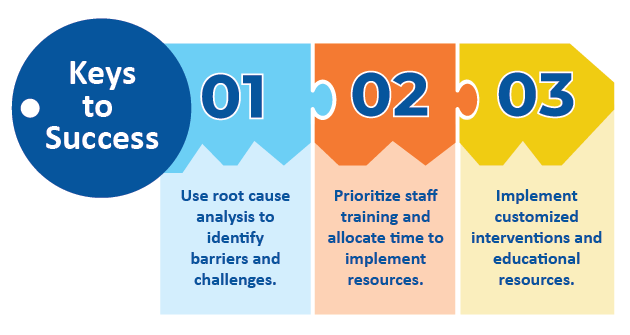
The Centers for Medicare & Medicaid Services (CMS) recently featured an article on its Quality Improvement Organization (QIO) website highlighting work performed by Health Quality Innovators.
A medium-sized nursing facility in Missouri was referred by the Centers for Medicare & Medicaid Services (CMS) to Health Quality Innovators (HQI), a CMS Quality Innovation Network-Quality Improvement Organization (QIN-QIO), for assistance with improving its resident COVID-19 vaccination rate. The facility serves individuals with psychological behavior issues and many of the residents have public administrators assigned to them as guardians. Due to COVID-19 misinformation, a number of guardians refused vaccines for the residents whose care they managed. Using targeted resources, HQI helped the facility achieve a 38.64% increase in its resident COVID-19 vaccination rate from the time the QIN-QIO made its initial outreach to the nursing home in January 2023. From the last report to the National Healthcare Safety Network (NHSN) in September 2023, the facility reported an 84.42% vaccination rate for current residents.
Root Cause Analysis Reveals Several Challenges
To assist the facility’s efforts in increasing vaccination rates, HQI conducted a root cause analysis (RCA) that revealed a concerning trend. Some of the public administrator guardians were consistently refusing vaccinations for the residents under their care; and, while the Infection Prevention (IP) nurse documented the refusals, the underlying concerns were not being effectively addressed. Many of the guardians were frequently saying no to vaccinations without proper justification. The opportunity for the facility to improve educational efforts became apparent. Together with HQI, the facility set an initial, but achievable goal, of increasing its resident vaccination rate by 10% through the use of motivational interviewing techniques.
Motivational Interviewing Coaching to Boost Guardian Confidence and Reduce Hesitancy
As a result of the support and training from HQI, the nursing home leadership’s perspective changed from “no one will consent” to looking for opportunities to shift the conversation with guardians and residents to address their individual concerns. HQI suggested prioritizing conversations with guardians who initially did not identify “why” they were refusing the vaccine and had been open to new care plan interventions in the past. HQI and facility leadership agreed that these individuals may be more likely to consider vaccination once their “why” was identified and addressed.
HQI then trained nursing home leadership by introducing motivational interviewing best practices during team calls and via email. Emphasizing patience during guardian conversations, HQI equipped the facility team with tools to navigate consent discussions, highlighting that overcoming fears is a gradual process. In addition, HQI encouraged persistence and maintaining open communication rather than pushing for immediate agreement. Although initial frustrations arose, the perseverance and HQI’s ongoing support paid off when consents began flowing in, proving the value of understanding, and addressing the root causes of reluctance. HQI enhanced motivational interviewing technique training using the following tools:
- Motivational Interviewing Strategies for Vaccination Readiness – Implementing motivational interviewing techniques to engage residents and guardians effectively.
- Mining for Motivation: Finding Others’ Internal Motivation with Person-Centered Interviewing – Identifying the internal motivations of residents to encourage vaccination.
- How to Address COVID-19 Vaccine Misinformation – Equipping staff with the skills to address and correct misinformation about COVID-19 vaccines.
- Myths and Facts about COIVD-19 Vaccines – Providing accurate information to counter misconceptions.
- Vaccine Letter to Residents and Family Members/Responsible Party – Offering clear and informative communication to residents and their guardians.
With these new skills, the IP nurse was able to navigate person-centered conversations with each guardian and effectively address their concerns by learning more about their original motivation for declining the vaccine. This individualized approach helped build trust and openness with the guardians which ultimately led to increased approvals for vaccines to be administered to residents.
As the infection prevention nurse gained confidence using motivational interviewing techniques, they ultimately reached out to all the guardians who initially refused vaccinations for their residents to achieve the 38.64% increase in its resident COVID-19 vaccination rate.
Keys to Success
HQI successfully achieved their goal, improved vaccination rates, and ensured the health and safety of the residents. HQI’s success can be replicated by taking the following steps:

Regional Impact of HQI’s Assistance
Per the NHSN weekly report dated September 24, 2023, the percentage of residents who are up to date in nursing homes that received assistance from HQI increased by 11 percent as compared to the average change in resident vaccination across all nursing homes in HQIs region.
This material was prepared by The Bizzell Group (Bizzell), the Data Validation and Administrative (DVA) contractor, under contract with the Centers for Medicare & Medicaid Services (CMS), an agency of the U.S. Department of Health and Human Services (HHS). Views expressed in this material do not necessarily reflect the official views or policy of CMS or HHS, and any reference to a specific product or entity herein does not constitute endorsement of that product or entity by CMS or HHS. 12SOW/Bizzell/DVA-1224-11/07/2023.
